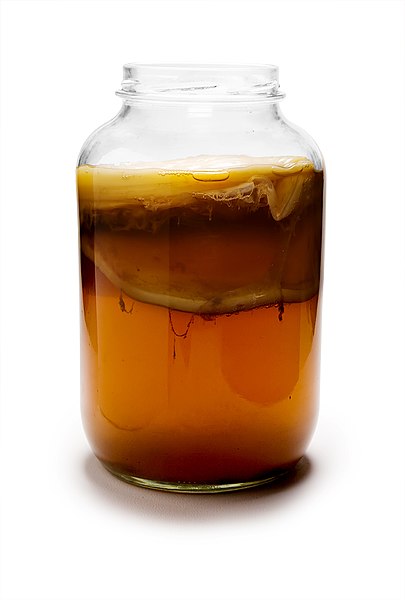
Kombucha is a fermented tea that has been used since antiquity. 1 Further, kombucha tea is a slightly acidic, functional beverage; the ancient living drink is consumed all over the world, but historically has been used in China, Russia, and Germany. 2 Kombucha is made from the infusion of tea leaves by the fermentation of a symbiotic culture of bacteria and yeast.
History
According to many sources, the exact history of kombucha has been lost over time. Dating back at least 2000 years, kombucha likely has Asian origins. Since then, kombucha has been passed around the Earth, from region to region, providing healthy refreshment wherever it goes.
More specifically, kombucha likely originated in the Far East, most likely China. Kombucha has been consumed in China for at least 2000 years. Circa 221 BCE, the first recorded use of kombucha originated in China during the Tsin Dynasty; it was known as the “tea of immortality.” 3 4
Fermentation
Kombucha is brewed from the bacteria and yeast that form the mother culture, which is often referred to as a SCOBY. An organic film and membrane, a pellicle, SCOBY is an acronym that stands for symbiotic culture of bacteria and yeast. The pellicle mother culture inoculates the sweetened tea and the aerobic fermentation of the tea infusion produces an acidic broth. Depending on how long the sweetened tea is fermented, the process of aerobic fermentation produces a liquid composition with a pH anywhere from 2.5 to 3.5. 5
Then, the kombucha can be placed in sealed glass bottles and fermented a second time to produce an effervescent beverage. In the modern day, this naturally carbonated drink is what is most often available at commercial retailers. The secondary fermentation is an anaerobic fermentation that produces more carbon dioxide (CO2), which gives the drink its characteristic fizziness.
Health Benefits
Among other agents as referenced in the cited journal article, kombucha contains probiotics, polyphenols, vitamins B1, B2, B6, B12, vitamin C, organic enzymes, amino acids, lipids, proteins, phenol, and other various minerals. 6
Kombucha, the potent ferment is recognized for its detoxifying, energizing, and overall health-supporting properties.
Kombucha contains antioxidants; and empirical evidence shows that kombucha protects rats’ liver from toxicity. 7 8
There are many other health benefits from kombucha; yet, most of these benefits are still being empirically demonstrated through clinical trials.
Further, I know from personal experience that drinking my home-brew kombucha on a regular basis over the years has greatly contributed to my overall health and well-being. In May of 2019, I recently got blood drawn from my Primary Care Doctor and all my blood results came back normal. I know now that I am healthier than ever; and I believe that my kombucha consumption contributes greatly to the well-being that I experience on an everyday basis.
Personal Experience
Since 2014, I have been brewing kombucha at home. Since then, I have had a couple breaks in my brewing; but I have brewed consistently since 2017. It brings me great joy to ferment my own kombucha. Sometimes the brewing and bottling process can seem laborious; yet, most times when I bottle and brew my kombucha, I find myself in flow state.
I produce eight 12 ounce bottles of kombucha each week. It takes me about 45 to 60 minutes to maintain my brewing operation. Each week, I brew one gallon of kombucha.
I like to share my kombucha product with my friends and family and they love it, so I love to share it. Friends of mine have told me that I should sell my kombucha product. Some day, I may do this because I have acquired and developed specialized knowledge of brewing and bottling kombucha.
While writing this article, I am enjoying some of my homebrew right now. I love kombucha so much. I wish that other people also enjoy this magical elixir.
Please comment below to share your experience with kombucha.
- Veliüanski, A. S., Cvetkoviü, D. D., Markov, S. L., Tumbas, V. T., & Savatoviü, S. M. (2007). Antimicrobial and antioxidant activity of lemon balm Kombucha.
- Greenwalt, C. J., Steinkraus, K. H., & Ledford, R. A. (2000). Kombucha, the fermented tea: microbiology, composition, and claimed health effects. Journal of Food Protection, 63(7), 976-981.
- Kaufmann, K. (2013). Kombucha Rediscovered!: Revised Edition The Medicinal Benefits of an Ancient Healing Tea. Book Publishing Company.
- Roche, J. (1998). The history and spread of Kombucha. Źródło: http://users.bestweb. net/~ om/~ kombu/roche. html,(10.10. 2014).
- Alex, H. A. (2019, April 01). PH & Kombucha. Retrieved from https://www.kombuchakamp.com/ph-kombucha-alkaline-acid-balance.
- Jayabalan, R., Malbaša, R. V., Lončar, E. S., Vitas, J. S., & Sathishkumar, M. (2014). A review on kombucha tea—microbiology, composition, fermentation, beneficial effects, toxicity, and tea fungus. Comprehensive Reviews in Food Science and Food Safety, 13(4), 538-550.
- Murugesan, G. S., Sathishkumar, M., Jayabalan, R., Binupriya, A. R., Swaminathan, K., & Yun, S. E. (2009). Hepatoprotective and curative properties of Kombucha tea against carbon tetrachloride-induced toxicity. J Microbiol Biotechnol, 19(4), 397-402.
- Dipti, P., Yogesh, B., Kain, A. K., Pauline, T., Anju, B., Sairam, M., … & Selvamurthy, W. (2003). Lead induced oxidative stress: beneficial effects of Kombucha tea. Biomedical and environmental sciences: BES, 16(3), 276-282.



Great resource! Good to hear you share you homebrew with family & friends. Me too.
Ian, I am glad you find my website to be that way. Oh yeah, for sure. When I enjoy something deeply, I realize, “I want to share this experience with those that I love.”